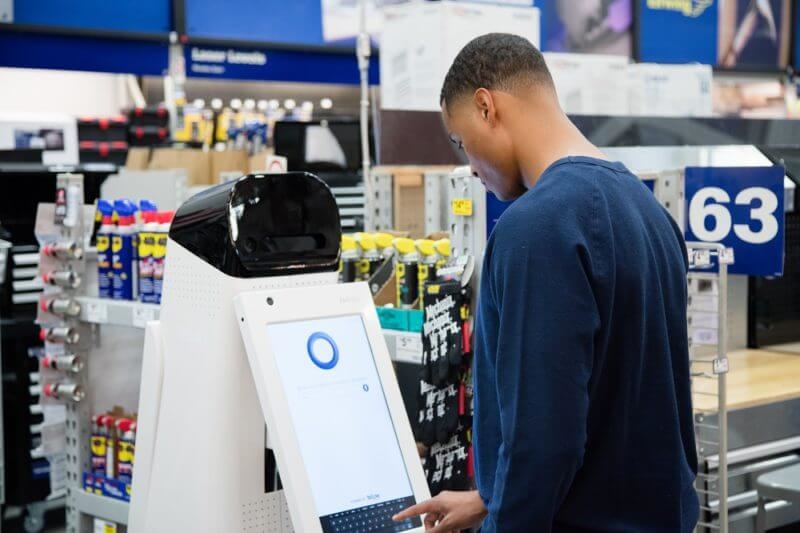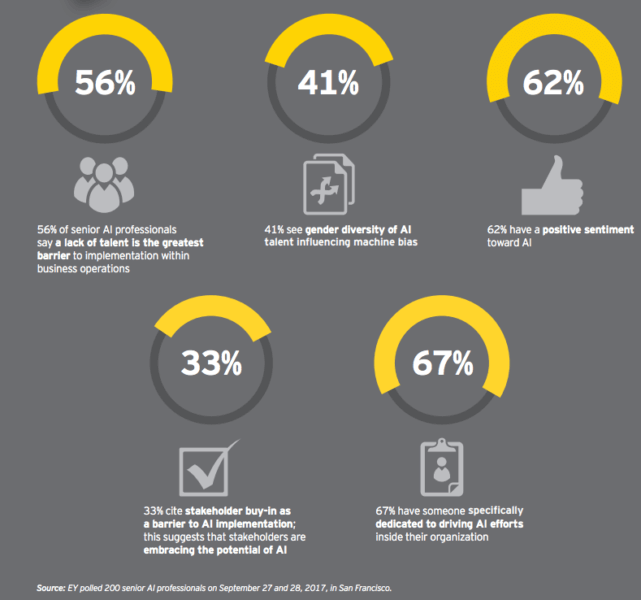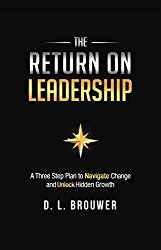Contributor Andy Betts details the talent gap that may be holding up the adoption of machine learning and AI in marketing but also offers suggestions on how the gap might be bridged.

The more I’ve had the opportunity to explore this concept of the martech mindset, the more I’ve realized how important it is that we shift our thinking to view artificial intelligence (AI) as an evolution rather than as a revolution. Artificial intelligence, once an abstract, futuristic concept, is now a reality, so this needs to occur sooner rather than later. It’s no longer a hypothetical; AI is changing the game for brands in tangible, practical applications.
Adoption is not the issue, as investments in AR and VR are expected to grow from $11.4 billion in 2017 to $215 billion in 2021, according to IDC.
Entire industries are finding innovative ways to solve persistent business challenges and create efficiencies through AI — take the proliferation of chatbots in marketing, for example. Individual brands are seizing the AI opportunity as well. Lowe’s “LoweBot,” an autonomous retail service robot that helps customers find products in-store in multiple languages, is another great example of the power of AI in practice.

Lowe’s LoweBot, pictured in a publicity photo
As the possibilities of AI are coming to fruition, our challenge now is adopting a new ethos and developing an AI mindset. A talent race fueled by a skills and education gap is underway, as more than 10,000 AI-related positions have opened across the country, Paysa research found. Recently, 56 percent of senior AI professionals polled by Ernst & Young said the lack of talent and qualified workers is the greatest single barrier to the implementation of AI across business operations.

How can we get into the AI state of mind, to fully capitalize on its myriad opportunities?
Building an AI mindset
We’ve speculated for about a decade now that with the rise of robotics and increased automation, a portion of the labor market would undergo an inevitable shift. At Sephora, for example, you can now get help choosing makeup from a chatbot that begins the process by quizzing you on your preferences. Of course, the application collects data to be used in marketing and R&D as well.
And in ad tech, companies like Adgorithms are using AI to drive transparency and accountability for advertisers. Its machine learning platform, Albert, uses a proprietary algorithm based on deep learning and predictive analytics to make decisions typically reserved for human marketers.
While AI applications can, in some cases, reduce the burden of physical labor, we still need people to develop and manage the machines. Even so, the labor market doesn’t seem to be keeping pace.
According to a Yahoo Finance report, IBM CEO Ginni Rommety recently told the Economic Club of New York, “If you look at just some pure numbers [for] the United States: half a million open tech jobs, 5 to 6 million open jobs in general. Our high schools only teach 25 percent of computer science. This great country only produced 400,000 computer science people. Hard to believe such small numbers.”
Despite this education gap, 35 percent of available AI positions require a Ph.D., according to Paysa, and 26 percent of employers are seeking candidates with a master’s degree.
Those brands may have more trouble than most filling those jobs. AI is such a fast-moving space that many are willing to look beyond formal education and are more interested in the skill set that enables candidates to flourish in the uncertainty. Joel Dodge, a software engineer at Infer, told Dice:
[We] expect everyone to do a lot of on-the-job learning. It is relatively uncommon to find candidates who have years of experience with machine learning problems, though it would be great if we could.
This AI-compatible skill set and mindset are proving incredibly valuable. Here’s how.
Critical thinking & developing an educator’s approach
Innovation has long been powered by our understanding of the problem we had to solve. We turn the problem over, examine it from various angles and brainstorm the various ways we can tackle it. We dream up the ways we can use the technology and talent available to us to generate a different outcome.
Part of the AI mindset is a shift in the way we approach problem-solving. AI must learn through mistake-making and in various iterations of a task over time while gathering information from a larger data set. Shepherding this process requires visionary talent with a relatively high tolerance for both risk and failure. AI professionals need the creativity to imagine how the technology can be applied, paired with the analytical acumen to measure results and determine success over time. They must be willing to take risks and perform experiments while being resilient enough to fail fast and move on faster.
Talent like this can only succeed within the right organizational culture. Companies that demand planning on a two-year or even annual schedule, and are committed to getting things done in a particular way, won’t be agile or flexible enough to move on AI. In martech especially, where over 5,000 companies have popped up in just a few short years, agility is a skill in hot demand.
As you’re looking to build your AI team, consider that traits like risk tolerance, creativity and resilience are typically deep-rooted. Data proficiency, on the other hand, can be learned.
Developing your data-centricity
According to job site Indeed.com, “[D]emand for workers with AI talent has more than doubled over the past three years, with the number of AI-related job postings as a share of all job postings up about 119 percent.” More and more, we’re seeing creatives — right-brain thinkers — cross-training and focusing on developing their analytical and data skills.
Barriers to AI entry are dropping with the advent of skills-based, specific university-level courses like Andrew Ng’s Deeplearning.ai courses. At Udacity, learners will get a full tuition refund if they haven’t found a job within six months of completing the machine learning engineer course. Through its OpenCourseWare, MIT also is offering intensive training in AI and machine learning.
These highly focused, job-specific courses are breaking down barriers to machine learning entry and bringing talent to market much faster. In marketing, for example, it means you don’t need to start over and chase another four-year degree or incur a boatload of student debt to work your way into AI. Better yet, prospects can tailor their skills to suit a specific employer.
Unifying left-brain analytical prowess with right-brain communication skills
Analytical skills, data proficiency and digital savvy are critical in AI professionals. However, organizations also need talent to innovate, to visualize AI solutions, to test multiple iterations and evangelize across departments. In many companies, this will fall into the CMO or marketing director’s realm, owing largely to their superior communication skills.
In addition to taking advantage of fast-paced and independent educational opportunities, marketing professionals also must develop their right-brain skills, including:
- Imagination and creativity.
- Empathy and a deep understanding of the connected consumers’ experience.
- Agility and resilience.
- Intuition and ability to listen attentively.
- Holistic thought and a high-level view.
- Openness to new ideas and processes.
Consider the way AI is being implemented at United States Postal Service. Their Smart Blue Box, a voice-activated mailbox introduced at CES last year, uses AI to answer questions, quote postage rates and even complete shipping transactions. In this one product, AI powers functions of marketing, operations and customer service.
Opinions expressed in this article are those of the guest author and not necessarily Marketing Land. Staff authors are listed here.
Marketing Land – Internet Marketing News, Strategies & Tips
(48)







